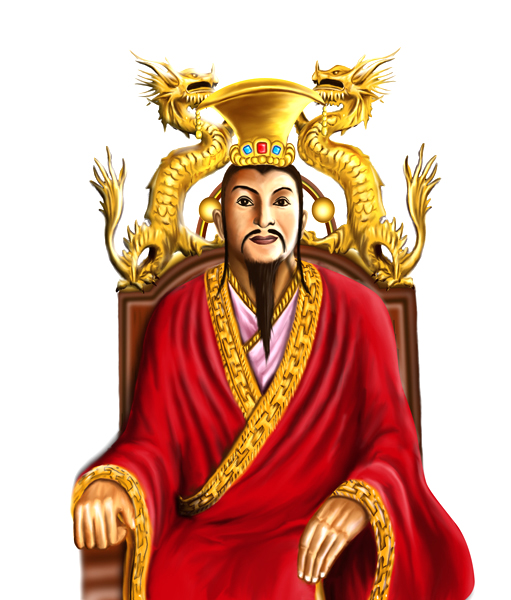 The last king of the Shāng 商 Dynasty is known to history as King Zhòu 纣 (reign 03a-31), and he is said to have been the most vicious ruler in all of history, as well as one of the most lascivious.
The last king of the Shāng 商 Dynasty is known to history as King Zhòu 纣 (reign 03a-31), and he is said to have been the most vicious ruler in all of history, as well as one of the most lascivious.Mad King Zhòu loved palaces, and he built a wonderful one at his capital town of Zhāogē (“Morning Song”) or Cháogē (“Royal Song”) 朝歌. (Today most people say Cháogē. It was located in what today is Qí 淇 county in Hénán 河南 Province).
The palace was full of gardens and pavilions and artificial lakes and tiny forests stocked with rare animals. The king loved to hunt, and he made sure that beyond the palace walls much land would be left uncultivated in order to provide good hunting grounds, although of course the plan was a bit hard on the farmers who had formerly lived there.
It is said that one artificial pond at the palace was kept filled with wine, and a nearby grove always had meat hanging from the trees. Together they were called the Wine Pond and Meat Forest (Jiǔchí Ròulín 酒池肉林), and King Zhòu used them to impress his guests with his enormous wealth and his ability to waste food and drink when ordinary people starved.
Mad King Zhòu is said to have been much amused by the suffering of other people, and the toadies and concubines he kept ever by his side pretended to share his pleasure in this. The story is told of his looking down from a tower of his palace one chilly morning and seeing a barefooted old man on the bank of the nearby river, hesitating to cross. The Concubine Dájǐ 妲己 suggested that the old man was afraid to cross because his legs would get cold. Why would they get cold? Well, perhaps because his bones were not solid enough. So the king sent a soldier to summon the old man and had his legs cut off so he could look at the bones. (That is why the river that runs through nearby Ānyáng 安阳 today is still called the “Leg Detaching River” (Zhéjìng Hé 折胫河).
Many were the forms of torture that King Zhòu invented to punish anyone who opposed him, for example by failing to pay taxes or, in the case of courtiers, of disagreeing with him or criticizing his behavior or (worst of all) comparing him with King Jié 桀 (reign 02a-18), the tyrant king of the preceding Xià 夏 dynasty whom King Zhòu’s ancestor, the great Tāng 汤 (reign 03a-1), had deposed for being a scourge. King Zhòu didn’t want to hear about all that.
One of his inventions was a kind of bronze log placed above a hot fire. A “criminal” would be forced to cross this “bridge” barefoot, and if the hot metal burning his feet made him lose his balance — which usually happened — then he fell into the fire and burned to death as the king and his concubines watched and laughed.
A courtier named Jiǔhóu 九侯 had a beautiful daughter, whom Mad King Zhòu discovered and forced to be his concubine. But the girl was reluctant, so he killed her. Then he had Jiǔhóu arrested and had his body ground into paste. A courtier named Èhóu 鄂侯 tried to intervene, so he too was killed, but rather than meat paste he was made into jerky and distributed to other courtiers who might be tempted to cross the king’s whim of iron.
Nevertheless other courtiers did try to influence the king as they watched the kingdom slowly slip into chaos and rebellion. The most famous of these was a man named Bìgān 比干. Because Bìgān sought to restrain the king’s cruelty, King Zhòu had his heart cut out to see if it looked kinder than other hearts. Some of their names are preserved in legend. A certain Wēizǐ 微子 perished in prison, and a man named Jīzǐ 箕子, seeing the dynastic end before him, escaped to live in secrecy. So did a minister named Shāngróng 商容. Some others surrendered to the forces of the rising rebels, who had allied themselves with the Zhōu 周 people to the west.
When the great battle came, Mad King Zhòu was almost immediately deserted by his armies, and the story ended as he rushed back into his palace and burned to death.
Of course, such important events are recounted in different ways by different people. Some say that the real villain was Concubine Dájǐ, who was even more ingenious than the king at inventing ways to kill people. Some even say that she was a fox fairy (húlí jīng 狐狸精), sent by the gods to make the king so self-destructive that the dynasty would end. But to accept that, you have to believe in fox fairies (and also in the gods and in the existence of Mad King Zhōu)!
--------------
http://anthro.ucsd.edu/cgi-bin/cgiwrap/dkjordan/chopera.pl?taleid=Story244
http://fc01.deviantart.net/fs70/f/2011/070/b/2/for_job_test_by_sharanart-d3ber4o.jpg


No comments:
Post a Comment